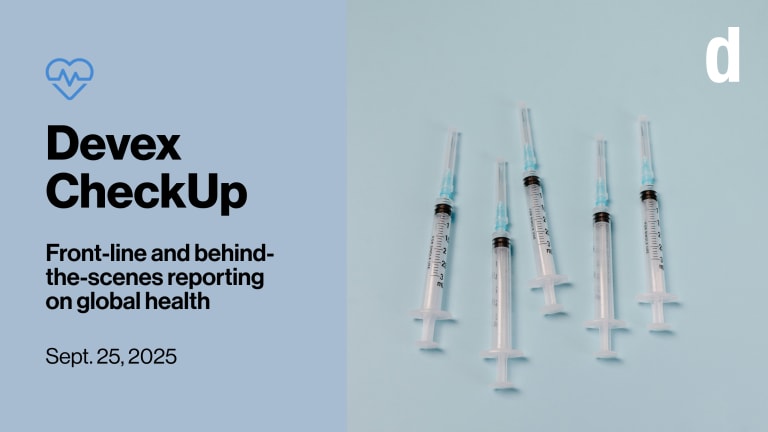Presented by The Bristol Myers Squibb Foundation

African leaders have declared an end to the era of development-as-usual. They are attempting to usher in a new period, dubbed the “Accra Reset,” with different governance, business, and financing models to support the response to everything from climate change to food security.
How it functions with regard to health will be the first proof of concept, though.
The effort began when a group of African leaders met in Accra, Ghana, in August to rethink a global health architecture being threatened by abrupt declines in donor aid. Many of those leaders reconvened at last week’s United Nations General Assembly to extend their vision across development and beyond Africa.
The idea starts with countries designing, owning, and, perhaps most importantly, investing in their health strategies. That means taking a hard look at current health systems to eliminate overlaps and stretching their resources to do more.
From that position of strength, countries can then take a more active role in their discussions with financing institutions and donors. And look for more innovative financing models and broader coalitions to diversify their risk.
Health — and particularly the response to the AIDS crisis — ushered in the era of aid. Now, global south leaders hope it can lead them toward a new model of more equitable partnerships.
Read: The ‘Accra Reset’ — time’s up for the legacy aid system
+ Explore: My colleagues and I are working on a series of articles examining the changing global health architecture — the big ideas floating around and plans to turn such ideas into tangible and hopefully meaningful change. Catch up on our reporting.
Tough talk
The push for reforms doesn’t stop with the Accra Reset. Former New Zealand Prime Minister Helen Clark, speaking at a Devex event on the sidelines of UNGA, said global health agencies also need to take a hard look at their own roles moving forward.
But she doesn’t want this to be some closed-door, secretive effort. She said it is the kind of thing that needs to draw in all stakeholders, both for input and to talk about how these agencies can better coordinate their actions.
Obviously donors will play a role in these talks, since they’ll determine what they want to support. But the global south also needs the chance to spell out its health priorities — like African countries have with the Lusaka Agenda, which provides a framework for better coordination between global health initiatives. This will help guide the discussions about which stakeholders are best positioned to support them.
Read: Global health reforms need ‘adult conversation,’ Helen Clark says
Spend wisely
With traditional aid in retreat, Malaria No More is pursuing a different strategy to get U.S. funding for malaria control efforts. The global nonprofit is emphasizing a return of $5.80 in economic growth for every $1 invested in the malaria response.
That translates into $126.9 billion in potential gross domestic product, according to a new report from Malaria No More and the Corporate Council on Africa, representing “one of the largest business opportunities hiding in plain sight.”
That’s because malaria is more than a health crisis. The report emphasizes the toll the disease takes on supply chains and on Africa’s overall growth, costing African economies $12 billion each year.
Malaria No More hopes this framing might influence the support malaria control efforts receive in the bilateral negotiations beginning between the U.S. government and African nations under the new “America First Global Health Strategy.”
Read: Why beating malaria is smart business for America
ICYMI: Trump administration releases long-awaited global health strategy
Not so fast
So much for consensus. The United States disrupted the expected approval of a declaration on noncommunicable diseases, or NCDs, at last week’s UNGA.
The declaration is meant to galvanize momentum for countries to do more to address NCDs and mental health challenges. Then U.S. Secretary of Health and Human Services Robert F. Kennedy Jr. stalled those efforts with his announcement that America would not support the declaration.
He cited concerns about language around “destructive gender ideology” and abortion, though neither is actually present in the declaration.
Instead of being approved the easy way, the document will now have to come up for a vote in the General Assembly, where it is widely expected to pass. Indeed, nothing about this process has gone smoothly, as three NCD experts explain in an opinion piece for Devex.
The declaration only arrived after months of negotiation that weakened initial targets and outcomes, particularly around tobacco use, unhealthy diets, and alcohol consumption. In fact, the U.S. — on behalf of the affected industries — was a vocal supporter of watering down these goals.
Unhappy with the outcome of those negotiations, the authors of the op-ed have laid out five steps for changing the process and reducing industry influence, including increasing transparency and engaging civil society more.
Read: US objections stall UN effort to tackle noncommunicable diseases
Opinion: How to make United Nations high-level meetings work for global health
Disinvited
Apparently, a reservation doesn’t guarantee you anything at UNGA.
The Global Health Council, which is currently suing the Trump administration over its aid cuts, had reserved a spot at an UNGA side event on the future of U.S. global health assistance. That didn’t stop Jeremy Lewin, the U.S. State Department official in charge of foreign assistance, from having GHC — a U.S.-based global health member organization — blocked from the event.
And if that didn’t make it clear enough how the administration felt about NGOs, he then delivered remarks criticizing them for squandering money and creating parallel systems. In line with the Trump administration’s new global health strategy, Lewin then emphasized the importance of bilateral agreements and private sector participation moving forward.
Read: Trump’s ‘America First’ global health plan sidelines NGOs
An investment case
It’s time to start thinking about health systems as doing more than just treating and preventing illness.
Vanessa Kerry, the World Health Organization’s special envoy for climate change and health, is also emphasizing the role health systems can play in boosting the economy and helping communities adapt to climate change.
If governments recognized the health sector as an economic driver that it is — in some countries, the field makes up one-fifth of the GDP — then they might be more interested in investing in it, she theorized.
The same goes for officials who understand the important role that health systems are already playing in responding to some of the worst consequences of climate change, including heatstroke and the outbreaks that can follow floods.
Read: Investing in health is investing in climate resilience, says WHO envoy
+ How does a major corporate player such as MSD — known as Merck & Co in the U.S. and Canada — structure its global health and social impact work? And where are there opportunities for collaboration? Find out in our Oct. 7 Devex Pro event with MSD senior officials. Save your spot now.
This event is exclusively for Devex Pro members. Not a Pro member yet? Start your 15-day free trial today.
Rethink
The pieces are starting to fall into place for ensuring the people who need it most have access to lenacapavir. That’s the groundbreaking HIV prevention tool that only needs to be injected twice a year. Prices are falling and supply is increasing.
But that’s not good enough, Abdullah Yusuf explains in an opinion piece for Devex.
Patients across Africa rely on private drug shops and pharmacies as their first stop for health care. So it makes sense to ensure those facilities are also able to deliver lenacapavir and at a price that people can actually afford.
That will require a reimagining of the supply chain to make it cheaper to actually get the prevention method to those private providers. Fortunately, as Yusuf writes, there are technological advances that could make that possible.
Opinion: A revolutionary HIV drug won’t matter if patients can’t afford it
ICYMI: New partnerships bring price parity between lenacapavir and oral PrEP
What we’re reading
After a woman in Long Island tested positive for chikungunya, officials are investigating whether the virus — which typically circulates in South America, Africa, and Asia — is now spreading in the United States. [The New York Times]
Young protesters staged one of the largest anti-government demonstrations in years in Morocco. Chief among their demands was bigger investments in public health. [Al Jazeera]
Republicans have proposed nearly $2 billion in cuts to the U.S. HIV response, which experts said could prompt tens of thousands of new transmissions and thousands of deaths. [NBC]








